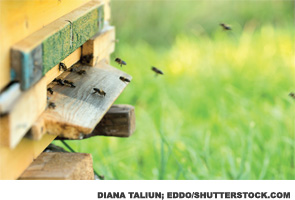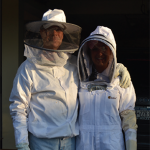
I have been thinking a lot about bees lately.
About a year ago, my wife had the idea that we should keep bees, because the lavender in our garden would be a good source for honey. Always being up for a new challenge, I attended a meeting for aspiring beekeepers and quickly became fascinated by the world of bees.
About Bees
The hobby is called “beekeeping” rather than “bee farming” or “honey farming” because the bees are quite capable of taking care of everything on their own, with no help from humans. The goal of the beekeeper is generally to enhance honey production so the bees have more than they need, so we can have some for ourselves.
Bees are fantastically organized, and they are born knowing what to do. It all begins with the queen—only one per colony—whose job it is to lay eggs, up to 1,500 a day for a really productive queen. The nurse bees then feed the developing egg bee bread, brood food and royal jelly (three days for a worker, and five days for a burgeoning queen). By Day 3, it’s a larva (looks like what a layperson would call a “maggot”), and then after another five or six days, it’s sealed into its cell for about 12 days while it undergoes what we called in elementary school metamorphosis. At that point, it chews its way out of the cell and is now officially a bee.
The queen has more to do than lay eggs. She secretes pheromones, olfactory signals somewhat akin to the cytokines that cells use to communicate with one another. These pheromones control the behavior of the worker bees. The absence of a certain pheromone tells the workers that they need to raise a new queen. A pheromone can also trigger the colony to swarm: The queen and half the colony leave a crowded hive to find a bigger home.
What is particularly amazing is that there is an orderly progression of bee duties that develops. The newest bees are charged with cleaning out the cells so the queen can lay more eggs and develop more brood, and then graduate to other duties requiring more experience. Examples: tending to the queen, making wax to build comb, packing pollen, guarding the entrance to the hive, ventilating the hive and taking out the trash. Only the most experienced bees get to graduate to the most exciting (and dangerous) duty, which is to venture forth from the hive to gather pollen and nectar.
What if doctors, hospitals, insurance companies & patients all worked together toward the idea that it is in everyone’s mutual interest that we all stay healthy?
Bees make honey so they can live through the winter, not for our gustatory pleasure. Honey is basically plant nectar that has been processed with bee saliva, stored in a cell and then dehydrated to a water content of 18% or less. The bees accomplish this by fanning their wings furiously to evaporate the water. Honey does not ferment due to this low water concentration. Somehow the bees know how to get it right, and then seal the honey cell with wax when it is just right.

